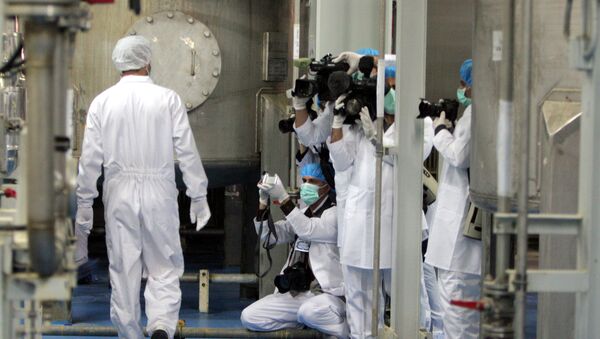In his speech at the UN General Assembly in New York Macron also called for a regional security plan for the Middle East which would also incorporate other crises of the region as well as security of maritime navigation.
But despite calls for a diplomatic resolution of the crisis, tensions continue to rise between Washington and Tehran, and US President Donald Trump lashed out at Iran in his UN address, calling the country “one of the greatest threats on the planet.”
Iran’s President Hassan Rouhani responded by saying that in order to de-escalate tensions in the region the US would first need to lift sanctions imposed against Tehran.
Gulriz Sen, Assistant Professor at the Department of Political Science and International Relations at TOBB University of Economics and Technology in Ankara believes that mutual accusations between the two countries have cast doubt on a possible meeting between Trump and Rouhani at the UN.
According to Sen, the US maximum pressure strategy against Iran and its aim to reduce to zero Tehran’s revenue on crude oil sales has led to an escalation of instability and tension in the region. If the US attempts to launch an attack on Iran, this will not go unanswered by Tehran, which has extensive experience in asymmetric combat operations, the scholar said.
“It is obvious that no one will benefit from such a policy - the United States, Iran, and the region as a whole will suffer significant losses. Earlier, Iranian authorities issued an important warning that any careless move can lead to an 'all-out war'. Iran’s military potential and power is not comparable to the US, but Iran is a country that, through asymmetric engagement can launch a missile strike on US forces and the US Navy in the Middle East,” the international relations professor explained.
Sen said that Tehran has emphasised that it does not intend to carry out any attacks until an attack is launched against it: “In this situation, as Iran made it clear, it is determined to give a proportionate response. As we can see, Trump's strategy has failed. No matter how much he talks about his commitment to peace and diplomacy, it is obvious that this strategy has led to an escalation of instability and tension in the Middle East,” she said.
The expert on Iran also noted that meetings between world leaders on the sidelines of the UN General Assembly are now taking place in an atmosphere of overall tensions following September 14 attacks on Saudi refineries and Iran’s Foreign Minister Javad Zarif will try to use his contacts during the visit to maintain international support for Iran and prevent any unfriendly steps towards it.
“The head of the Iranian Foreign Ministry is likely to pursue an effective foreign policy strategy and carry out diplomatic contacts in accordance with the rather narrow framework set before him. Despite the sanctions imposed on the country, he had previously participated in the General Assembly sessions. This time around it will be held amid rising tensions over attacks in Saudi Arabia. For this reason, diplomatic contacts built earlier are very important here,” Sen stressed.
She pointed out that Tehran may benefit from the Israeli Prime Minister Benjamin Netanyahu not being able to attend this year’s gathering at the UN: “I think that the absence of Netanyahu will be used by the Iranian side as an advantage in terms of maintaining international support for Iran and preventing actions directed against it. Also, I think that we can witness a peculiar “hide and seek” game between Rouhani and Trump in the UN corridors,” Sen noted.
Tensions have flared up between the US, Saudi Arabia, and Iran after drone attacks on Saudi Arabia’s oil infrastructure on September 14, which heavily disrupted the kingdom’s oil production. Tehran has repeatedly denied any involvement in the strike and Yemen’s Houthis rebels claimed responsibility for it.
But the US and its allies have accused Tehran of being behind the attacks. Pentagon has since announced that the US will be sending more troops to Saudi Arabia and the Trump administration introduced more sanctions on Iran.
Iran has retaliated with some stern warnings promising to “destroy” any country that attacks it first.
Iran’s President Hassan Rouhani is set to give a speech at the UN General Assembly on Wednesday.



